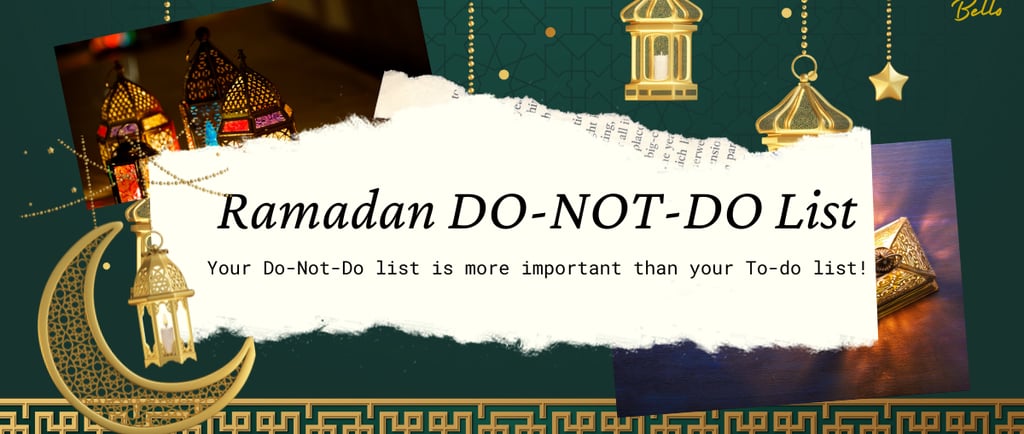The Importance of a "Do NOT Do List" for Ramadan
Ever heard of the 'Do NOT do list'? Your Ramadan journey isn't just about what you plan to do but also what you vow to avoid. It's about shedding those habits that distance you from Allah, the ones draining your good deeds. As you fast, remember: forsaking bad habits for 30 days can lead to a lifetime change. Replace the negative with positive, for transformation requires not just cessation but redirection. Our 'Mindful Ramadan' journal is your guide, helping you track progress, reflect, and, ultimately, celebrate your growth. Let's embark on this journey of self-improvement, guided by Al Hadi and embraced by Al Affuw. Together, let's empower our souls this Ramadan. - Hauwa Bello
Hauwa Bello
3/5/20244 min read


The "Do NOT do list" is a concept that can be particularly relevant during the holy month of Ramadan. In this article, we will explore the significance of creating a "Do NOT do list" for Ramadan and how it can help us break bad habits and avoid sins that hinder our relationship with Allah.
Understanding the "Do NOT Do List" for Ramadan
During Ramadan, Muslims strive to cleanse their souls, seek forgiveness, and strengthen their relationship with Allah. It is a time of self-reflection and self-discipline, aiming to improve one's character and spirituality. While many focus on the positive actions to take during this month, such as prayer, charity, and reading the Quran, it is equally important to identify and eliminate negative behaviors.
The "Do NOT do list" for Ramadan refers to those bad habits and sins that we want to stop. These are the actions that have become second nature to us, but we know they are detrimental to our relationship with Allah. They drain our good deeds and prevent us from fully benefiting from the blessings of Ramadan.
The Significance of Breaking Bad Habits and Avoiding Sins
Breaking bad habits and avoiding sins during Ramadan holds immense significance in the eyes of Allah. It demonstrates our commitment to self-improvement and our willingness to rectify our behavior. The Prophet Muhammad (SAW) emphasized the importance of leaving behind evil words and deeds while fasting, stating that Allah does not need us to simply abstain from food and drink if we continue to engage in sinful behavior.
By actively working on our "Do NOT do list" for Ramadan, we show our sincerity and dedication to purifying our hearts and souls. It is a time to reflect on our actions, seek forgiveness, and make a conscious effort to break free from the negative influences that hold us back.
Identifying Your "Do NOT Do List" for Ramadan
Creating a "Do NOT do list" for Ramadan requires self-reflection and honesty. Take a moment to evaluate your actions and identify the habits and sins that you want to eliminate from your life. Here are some common examples to consider:
Gossiping
Backbiting
Engaging in dishonesty
Procrastination
Wasting time on social media
Excessive consumption of unhealthy food
Anger and impatience
Jealousy and envy
Neglecting/delaying prayers
These are just a few examples, and your personal "Do NOT do list" may include other habits or sins that are specific to you. The key is to identify the behaviours that are hindering your spiritual growth and have a negative impact on your relationship with Allah.
Implementing Your "Do NOT Do List" for Ramadan
Once you have identified your "Do NOT do list" for Ramadan, it is important to develop strategies to avoid these behaviours. Here are some tips to help you implement your list:
1. Seek Allah's Guidance and Forgiveness
Turn to Allah for guidance and seek His forgiveness for past mistakes. Pray for the strength and willpower to overcome the habits and sins on your list. Remember that Allah is the most merciful and forgiving, and He will assist you in your journey towards self-improvement.
2. Replace Negative Habits with Positive Ones
Instead of simply focusing on what not to do, replace negative habits with positive ones. For example, if you want to avoid gossiping, engage in conversations that promote kindness and positivity. If you want to eliminate procrastination, create a schedule and prioritize your tasks.
3. Surround Yourself with Supportive Individuals
Build a support system of like-minded individuals who share your commitment to self-improvement. Surrounding yourself with positive influences can help you stay motivated and accountable. Joining a local mosque or Islamic community can provide opportunities for spiritual growth and guidance.
4. Practice Self-Control and Discipline
Ramadan is a month of self-discipline and self-control. Use this time to strengthen your willpower and resist temptations. Remind yourself of the rewards that await those who successfully overcome their bad habits and avoid sins during this sacred month.
5. Reflect and Evaluate Regularly
Regularly reflect on your progress and evaluate your actions. Take note of any slip-ups and make a conscious effort to learn from them. Use these moments as opportunities for growth and improvement. Remember that change takes time, and Ramadan provides the perfect environment for transformation.
The Benefits of a Successful "Do NOT Do List" for Ramadan
Successfully implementing your "Do NOT do list" for Ramadan can bring about numerous benefits:
1. Strengthened Relationship with Allah
By eliminating bad habits and avoiding sins, you create a space for a deeper connection with Allah. Your prayers become more sincere, your worship becomes more meaningful, and your overall spirituality is enhanced.
2. Increased Self-Awareness
Working on your "Do NOT do list" requires self-reflection and self-awareness. As you become more conscious of your actions, you develop a better understanding of yourself and your weaknesses. This increased self-awareness can lead to personal growth and positive change beyond the month of Ramadan.
3. Improved Character and Behavior
Breaking bad habits and avoiding sins leads to improved character and behaviour. You become more patient, kind, and compassionate towards others. Your interactions become more positive, and you contribute to a harmonious community.
4. Preservation of Good Deeds
By eliminating negative behaviours, you prevent your good deeds from being wasted. Ramadan is a time of immense blessings, and ensuring that your actions align with your intentions allows you to fully benefit from these blessings.
5. Lasting Impact
The positive changes you make during Ramadan can have a lasting impact on your life. By breaking free from bad habits and avoiding sins, you create a foundation for long-term self-improvement. These changes can continue to shape your character and behaviour beyond the holy month.
The Mindful Ramadan all-in-on journal and planner has pages curated for you to list your Do not do list (bad habits you want to stop) and pages to help you track your progress as you eliminate those habits while replacing them with good habits. It also has questions to explore your experiences and don’t forget to reward yourself at the end of it all.
May Al Hadi guide us in taking the right step towards a fulfilling and Taqwa-filled Ramadan.
May Al Affuw, He who loves to forgive, forgive our sins and help us to stop ✋ those bad habits and replace them with habits that he is most pleased with. Ameen.
Dont forget...
Creating a "Do NOT do list" for Ramadan is a powerful tool for self-improvement and spiritual growth. It allows us to identify and eliminate the habits and sins that hinder our relationship with Allah. By actively working on our "Do NOT do list" during Ramadan, we demonstrate our commitment to positive change and strive to become better individuals. May this Ramadan be a transformative journey for all of us as we seek forgiveness, purify our hearts, and strengthen our connection with Allah, the Ar Rahmani rohimin.
You can get your journal Here.
Hauwa Bello… empowering thee.
Subscribe to my newsletter for articles on holistic living, mental health, mindfulness, faith, and more.



